2020年FCE考试写作模板之非正式书信,FCE书信写作指南与技巧
2020年FCE考试写作模板之非正式书信,FCE写作的类型较之PET更加广泛,增添report,essey,review,Article,字数也是上升到了多达180字,不过所幸,FCE写作还是可以选择性写,一般孩子都能避开这些较难和正式的文体。而经过训练,letter和story还是能得到一个比较满意的分数。今天英普乐思小编就介绍一下FCE写作模板-非正式书信。
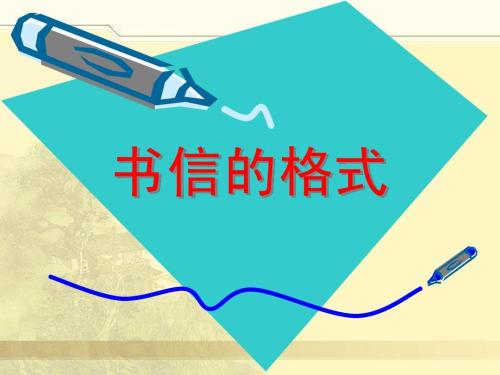
什么是非正式信件(informal letter)?
An Informal letter or email Is usually between people who know each other fairly well.In addition to giving news, they are often used to request Information, congratulate people, give advice and ask questions. There are a lot of similarities between Informal letters and conversation. Informal letters ask a lot of questions, show Interest and enthusiasm.
非正式信件常见于熟悉的人之间。除去了解对方近况以外,非正式信件中常会出现询问信息、祝贺他人、给出建议、回答问题。非正式信件跟对话很相似,都会问很多问题,表现出兴趣和热情。
非正式信件写作注意事项
ANSWER ALL THE QUESTIONS 答出所有问题
In many exam questions, you will be told what to Include In your reply. Make sure that your reply answers any questions that you wore asked in the task and takes into account any additional information that you have been told to mention. It Is Important that you include these in order to get a good grade.
很多写作真题都会告诉你你的信件中应该包括的内容。一定要确保自己的回信中回答了所有题目提出的问电并且包括了所有你需要写到的任何额外信息。想得到高分,就必须按照题目要求写出所有内容。
RANGE词汇和语法广度
It Is Important that you use grammatical expressions and vocabulary appropriate to the level of the exam. Even If there are no mistakes In your writing, you will not be able to get a good grade if you use only the language and vocabulary that you learnt at elementary level. Even in Informal writing, there is a good range of language you
can use (conditional sentences, a range of perfect and continuous tenses, Indirectquestions...)
写作中使用和考试级别相称的语法表达和词汇是非常重要的。如果你在写作中只使用初级词汇和语法,哪怕你没有犯任何错误,你的写作成绩也不会特别理想。即使是招E正式信件中,你也可以使用尽可能多样化的语言(条件句、各种完成时和进行时态、间接问题等)
INFORMAL WRITING STYLE非正式的写作风格
Use Informal language, Including phrasal verbs, Informal vocabulary, contractions,question tags.
使用非正式的语言,包括短语动词(turn up, bump into, come across, look up, etc)、不正式的词汇(I guess you loved the pics)、缩写(I've been really busy)、反意疑问句(It's beautiful, isn't It?)
CONNECTORS 连接词
All good writing makes good use of connectors. However, many of the connectors you have leamt for other styles of writing are Inappropriate In an Informal letter or email. For informal writing,you need to use some of the connectors that are more specific to spoken language.
所有好作文都要充分使用连接词。但是,你在其他文体中学到的很多连接词并不适合用于非正式信件中。对于非正式信件,你要使用一些较为口语化的连接词。
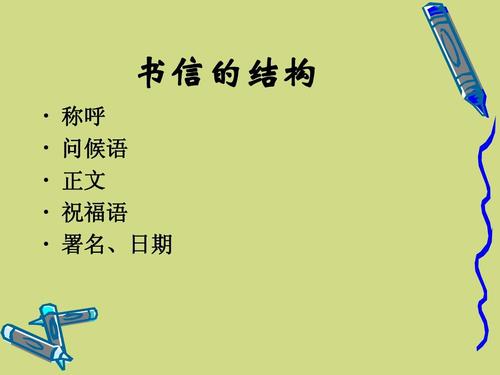
Tb Introduce a topic:
Well, you'll never guess who I bumped Into yesterday.
I know how much you love tennis, so I've got us some tickets to Wimbledon.
By the way, did you know that John's got a new Job?
Td go back to a Drevlous topic:
Anyway, as I was saying earlier, I really wasn't very happy there.
Now where was I? Oh yes, I neariy forgot, Mary asked me tell you about the cinema.
Tb Introduce surprlslnq or bad news:
Actually, he came to the party after all.
I'm really sorry but I can't make It.
To tell you the truth, I don't really like sports much.
Tb summarise what you've already said:
Anyway, we had a really nice time in the end.
Well, to cut a long story short, we didn't get there on time.
非正式信件各部分写作指南
GREETING 间候
Start with Dear followed by the first name of the person to whom you are writing. Inemails, you can also start with HI (and the person's name).
Dear Bon,
HI Ben,
Don't forget to use only the first name of th© person you are writing to and not Dear Mr John, which Is never used, or Dear Mr John Brown, which sounds too formal.
别忘了只使用收信人的名字,而不是Dear Mr John,英文从不这样用,也不要用Dear Mr John Brown,这太正式了 !
BODY正文
OPENINGS 开头
When writing an informal letter, you are usually replying to another letter. You would normally start with a greeting, then acknowledge the letter to which you are replying.It Is often a good idea to acknowledge some key information given In the original letter too. You can also make a comment on your own reply.
写非正式信件时,说写的都是回信。通常要用问候的语言开头,然后感谢对方的来信。
在开头提及对方的来信主要内容也是极好的,你也可以评论一下自己的回复(比如说自己回信太晚了等)
Useful phrases for the opening
How are you? / How have the family been? / I hope you are well.
Thank you / Many thanks for your (recent/last) letter / postcard.
It was good / nice / great to hear from you again.
I was so surprised to hear that...
I'm sorry I haven't written / haven't been In touch for such a long time.
It*s ages since I've heard from you. I hope you're well / you and your family are well.
How are things? / How are you? / How's It going?
Other useful phrases
Referring to news
Great news about...
Glad to hear that...
Sorry to hear about...
Giving news
Listen, did I tell you about...? You'll never believe what...
Oh, and another thing ... This Is just to let you know that...
I thought you might be Interested to hear about / know that...
By th© way, have you heard about / did you know that...?
Apologies
I'm writing to apologise for missing your party but I'm afraid I was with flu.
I'm really sorry that I forgot to send you a birthday card but I was busy with my
new job.
Invitations
I'm / We're having a party on Friday 19th and I / wg hope you'll be able to come.
Would you like to come / go to see 'Room With a View' with me at the weekend?
I was wondering If you'd like to go to the theatre / come on holiday with us.
Could you let me / us know If you can come / you*d like to Join us?
Thank you very much for your Invitation. I'd love to come.
Thank you for asking / Inviting me to ... but I'm afraid I won*t be able to ...
Requests
I'm writing to ask for your help / you (If you could do me) a favour.
I wonder If / I was wondering if you could help me / do me a favour.
I hope you don*t mind me asking but could you (possibly)...?
I'd be very / really / terribly grateful If you could ...
Thank vou / Congratulations / Good Luck
I'm writing to thank you for your hospitality / the wonderful present.
It was so kind of you to invite me to stay with you.
I really appreciated all your help / advice.
Congratulations on passing your exams / your excellent exam results!
I wish you good luck / Good luck In / with your exams / your driving test / your
Interview.
Don't worry, Tm sure you*ll do well / pass.
Do be on time, won*t you, and don't forget to ...
Making suggestions and recommendatIons
Why don't you ...? / Maybe you could ...? / How about...?
You can't leave New York without (...doing sth)
I'm sure you will enjoy (...doing sth). If you like, we can ...
Do visit... / Don't forget to ...
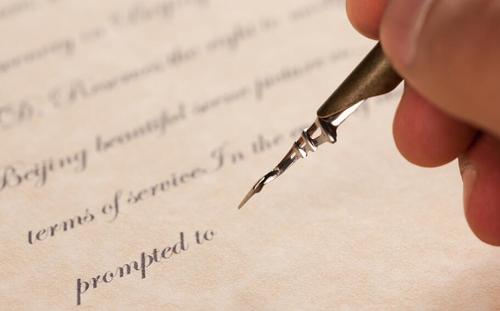
CLOSING 结尾
The end of your letter Is as important as the beginning. There are some standard
ways of finishing an Informal letter or Emall.
结尾和开头一样重要,写结尾一般有几种标准的方式。
Give a reason why you,re ending the letter 写出结束写作的原因
Anyway, I must go and get on with my work!
I guess it's time I got on with that studying I've been avoiding.
Send greetings and/or make reference for future contact 结尾问候和希单尽快收到回信
Give my love / regards to... / Say helb to...
Anyway, don't forget to let me know the dates of the party.
I'll try and phone you at the weekend to check the times.
We must try and meet up soon.
I can't wait to hear from you / Look forward to seeing you again / Hope to hear
from you soon / See you soon / Write soon
Closing statement信末祝福语
Love,
Lots of love,
All the best,
Take care,
Best wishes,
Signing off 签名
Jack
Mary
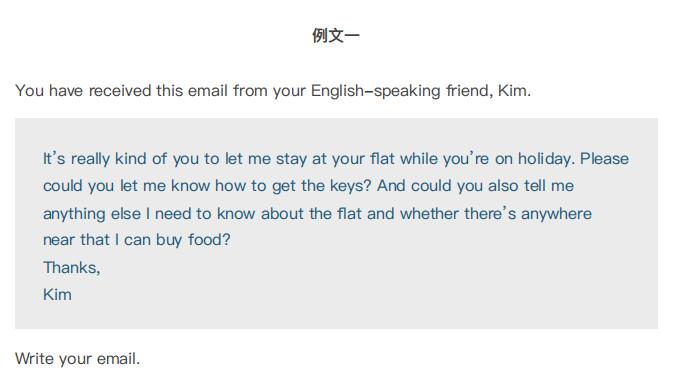
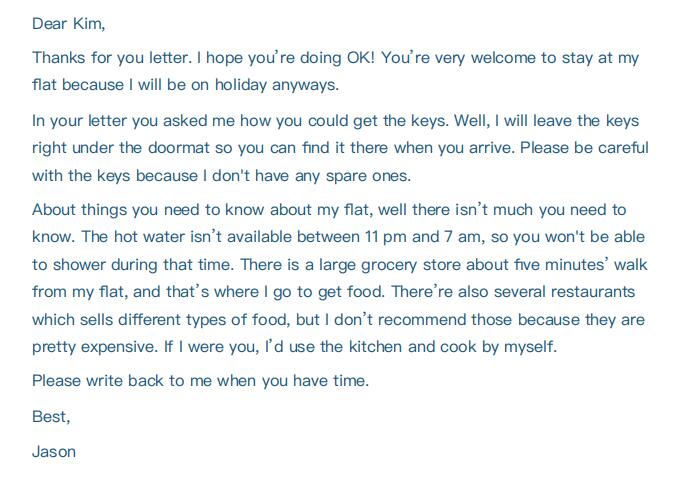
好了本期小编就2020年FCE考试写作部分书信写作指南技巧就分享到这里,如果需要更多写作模板请添加小编个人微信【yingpulesi】来获取更多FCE写作必备知识。
即可免费领取2021最新FCE真题!
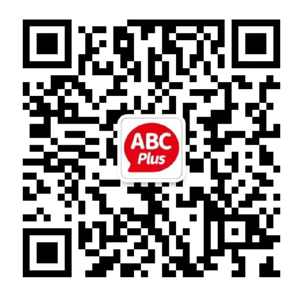
版权声明:此文章部分内容与图片来自网络,如若侵权请联系客服立刻删除。
如需转载注明:【本文章来自- 英普乐思ABCPlus www.abcplusedu.cn】









